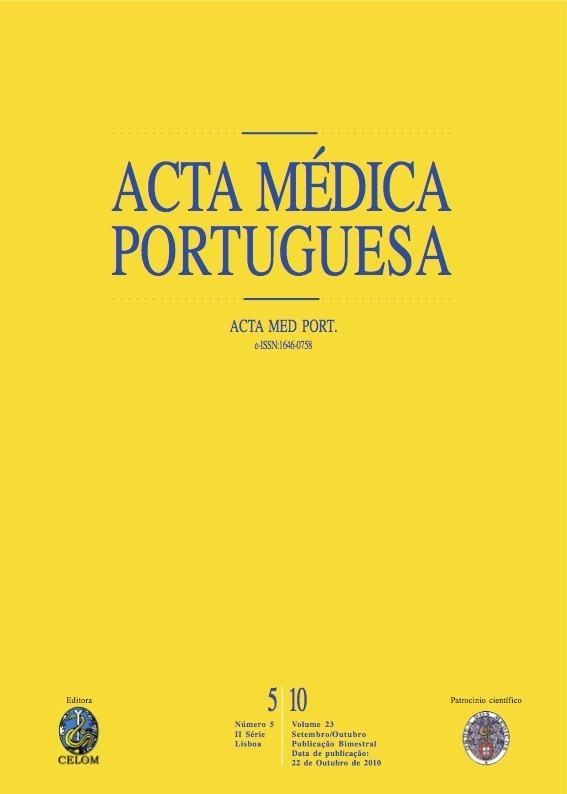Avaliação de anticorpos antisaccharomyces cerevisiae e auto-anticorpos em doentes com doença inflamatória intestinal.
DOI:
https://doi.org/10.20344/amp.719Resumo
The incidence of inflammatory bowel disease (IBD) has been increasing worldwide, and despite the advances regarding their pathogenesis and therapeutics, the differential diagnosis between Crohn's Disease (CD) and Ulcerative Colitis (UC) is mainly based on clinically invasive tests. Recent studies have identified new serological markers with a potential value for the diagnosis of these pathologies, in particular the anti-Saccharomyces cerevisiae antibodies (ASCA) and anti-neutrophil cytoplasmic antibodies (ANCA). Also of note are the anti-goblet cells antibodies (anti-CCI) and the anti-pancreatic exocrine autoantibodies that react with the pancreatic acinus (anti-AP). We assessed these new serological markers and compared the efficiency between immune enzymatic (ELISA) and indirect immunofluorescence tests in the identification of ASCA of IgG or IgA class. We studied a set of 81 serum samples (with an initial diagnosis of IBD) and 33 control samples from healthy blood donors. The laboratory tests were correlated with the diagnosis of each patient, established in the Gastroenterology outpatient unit based on conventional methods. The agreement between the two laboratory methods employed in the identification of the ASCA was excellent (k = 0.63) for the IgG antibodies and good (k = 0.56) for the IgA antibodies. We found a weak agreement (k = 0.137) between ELISA (MPO and PR3 purified antigens) and the IFA test for ANCA. Regarding the serologic markers ANCA, anti-AP and anti-CCI, only the later showed no differences in the distribution of positive results between the studied groups. Positive ASCA IgG and IgA were significantly associated with diagnosis of DC, with both laboratorial methods tested. The identification of ANCA with the available solidphase tests does not seem appropriate for the screening of the autoantibodies with the atypical p-ANCA pattern of IBD. The combination between anti-AP and ASCA antibodies seems a good option for the laboratorial diagnosis of CD. This study shows that these serologic markers in spite of being non invasive laboratory tests, also have a considerable overlapping in the different IBD. Nevertheless, further prospective studies based on larger populations are required to clarify the relationship between these antibodies, the diagnosis and clinical evolution of inflammatory bowel disease.Downloads
Downloads
Como Citar
Edição
Secção
Licença
Todos os artigos publicados na AMP são de acesso aberto e cumprem os requisitos das agências de financiamento ou instituições académicas. Relativamente à utilização por terceiros a AMP rege-se pelos termos da licença Creative Commons ‘Atribuição – Uso Não-Comercial – (CC-BY-NC)’.
É da responsabilidade do autor obter permissão para reproduzir figuras, tabelas, etc., de outras publicações. Após a aceitação de um artigo, os autores serão convidados a preencher uma “Declaração de Responsabilidade Autoral e Partilha de Direitos de Autor “(http://www.actamedicaportuguesa.com/info/AMP-NormasPublicacao.pdf) e a “Declaração de Potenciais Conflitos de Interesse” (http://www.icmje.org/conflicts-of-interest) do ICMJE. Será enviado um e-mail ao autor correspondente, confirmando a receção do manuscrito.
Após a publicação, os autores ficam autorizados a disponibilizar os seus artigos em repositórios das suas instituições de origem, desde que mencionem sempre onde foram publicados e de acordo com a licença Creative Commons









